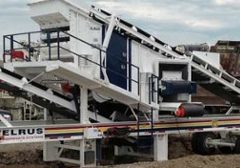ELRUS Aggregate Systems offers these small checks to ensure screening success:
- Check oil levels and grease bearings, and shaft.
- Adjust tension springs and drive belts.
- Make sure there is no build up on the hopper or cross member.
- If the screen hits any parts it may cause the screens performance and or damage the screen.
- Check screen cloth for physical damage.
Unsure if low production is caused by screening issues?
- While operating at capacity, take a sample from the cone feed belt.
- Run a quick sieve analysis of this sample.
- You should find less than 10 percent of your material is finer than the size of your screen size.
If you have more than this, check the following:
- Are your screens plugged? You may need to clean or use a self-cleaning screen cloth.
- Is the bed depth excessive? Can you see the clamp bars?
- Check the speed of the screen at the shaft with a tachometer. Even a small reduction in screen speed will cause serious problems. Could be a worn sheave or poor belt tension.
- You may be exceeding the capacity of the screen.
- Do you have a loose screen panel? You will see material jumping on the cloth.
Loose Screens?
- A sure sign of loose screens is a piece of screen cloth that is always breaking in the same location, usually over a bar.
- Are the bolts correctly tightened?
- Are the clamp bars worn out? Be sure to check the inside where they fit to the screen hooks.
- Check crown rubber, may be missing or in poor shape.
- Is the crown worn down? If the plant was operated with crown rubber missing at one time the crown bars may be worn down. Repair as required.
ELRUS Aggregate Systems, www.elrus.com

